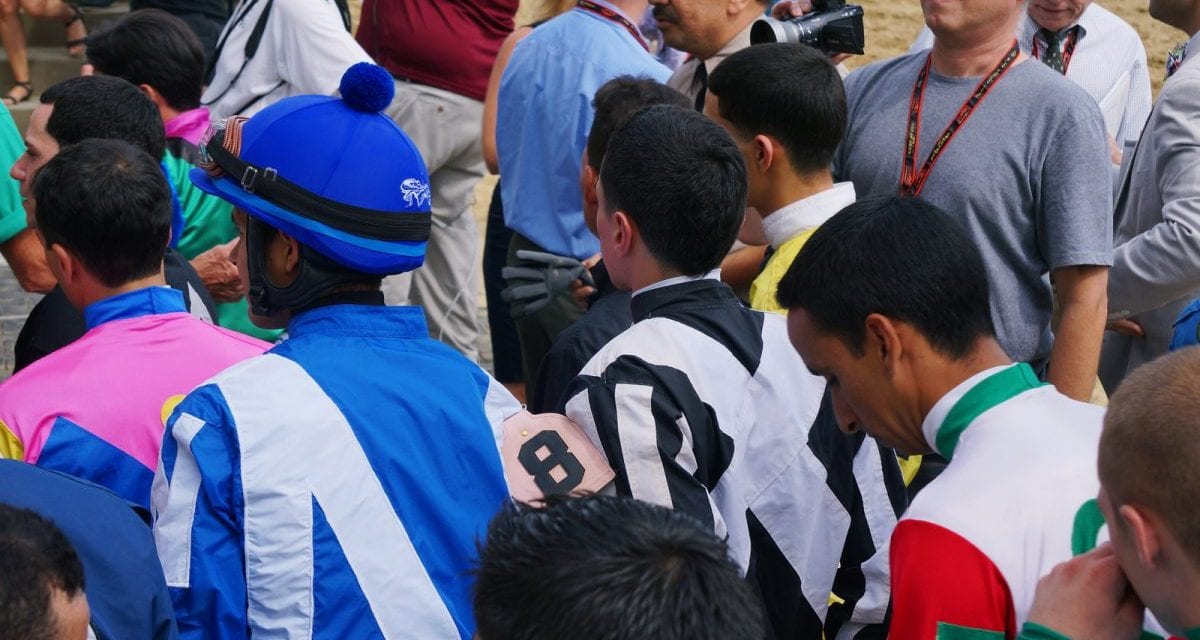by Teresa Genaro
The International Conference on the Health, Safety, and Welfare of Jockeys lived up to its name at Monmouth Park on September 13 and 14, with representatives from South America, England, Ireland, Australia, France, and Germany.
And a few people from the United States — but only a few — showed up, too.
“I don’t understand it,” said John Wayne, executive director of the Delaware Racing Commission. “We were the only state that was there.”
Though industry organizations such as The Jockey Club and the Jockeys Guild sent representatives, no one from a state racing commission other than Delaware was present.
“We came last year, too,” said Wayne by phone from his office at Delaware Park. “I thought that what we learned was so worthwhile, and it gave us ideas and initiatives to improve what we’re doing now.”
Over the two days of the conference, researchers, doctors, and executives presented on issues including nutrition programs for apprentice jockeys, research into concussions, and improvements in safety equipment.
Wayne found particularly interesting a presentation by Dr. W. Dalton Dietrich, the scientific director of The Miami Project to Cure Paralysis. Dietrich presented on the effects of lowering body temperature on paralysis following neck and spinal cord injuries.
“That was something,” said Wayne. “We learned a lot about how body temperature has a lot to do with injuries. That was very informative to us.”
Wayne came away from last year’s conference with the realization that protocols for riding accidents should be similar to those for motorcycle accidents, so he and other representatives from Delaware Park went to their local hospital to meet with medical personnel.
“We brought film with us that showed the extent of what happens in our industry,” he explained. “We told them we’d get them DVDs of accidents so that the medical staff can review them so that they can see what actually happened to the jockeys they’re treating. We can get films over there within an hour of the accident.”
Also impressive, said Wayne, was the work at Oaksey House, a rehabilitation center for injured jockeys in Lambourn, England.
“That was excellent,” he said.
He praised the work of Denis Egan, the chief executive of the Irish Turf Club (the regulatory body for horseracing in Ireland) and the conference chairman, in putting together the program.
“I think we can all learn from one another,” he said. “I was particularly impressed that The Jockey Club was there, and Guild representatives. One of the doctors from Monmouth was there, and our jockeys’ association and Professor Snider from the University of Delaware.”
Snider is a professor and food safety and nutrition specialist in the department of animal and food sciences at the University, and she has worked for several years with Delaware Park on nutrition programs.
“We did a nutrition seminar the week before [the conference],” said Wayne. “We do one every year, to try to give jockeys awareness about making healthy choices. Don’t eat that doughnut, don’t drink that power drink filled with carbohydrates and empty calories.
“We trying to have better choices in the jockeys’ room, but habits learned [by jockeys] over a lifetime are hard to change.”
Wayne also expressed interest in the presentations about upgrading helmets and other safety equipment, noting that Delaware Park will periodically confiscate vests in use at the track.
“There are a couple [that I see people wearing] that I wouldn’t go fly-fishing in,” he said. “The hook would go through it.”
Given Wayne’s enthusiasm, it’s a shame that more U.S.-based regulators didn’t attend in 2012 or 2013, when the conference was held at Monmouth Park. Their next opportunity will be in 2015, when it will take place in Hong Kong, and there was talk of smaller, regional meetings to encourage more people to attend, which, based on Wayne’s comments, would seem to be a good thing for the industry here.
“I think,” he said, “we do things a lot better as a result.”
(Featured photo by Vas.)








Hong Kong was also in attendance.
Perhaps the State Employees from New Jersey, New York, Pennsylvania and Maryland required some type of Graft to arouse their interest. I’m sure Maryland State Employees were expecting at least; three meals, accommodation, and an envelope with some type of compensation. Was there shopping nearby? Maryland has a history of providing State and Municipal workers with Gift Cards from major retailers as a token of appreciation for their loyalty. I do give Monmouth credit for hosting the event.